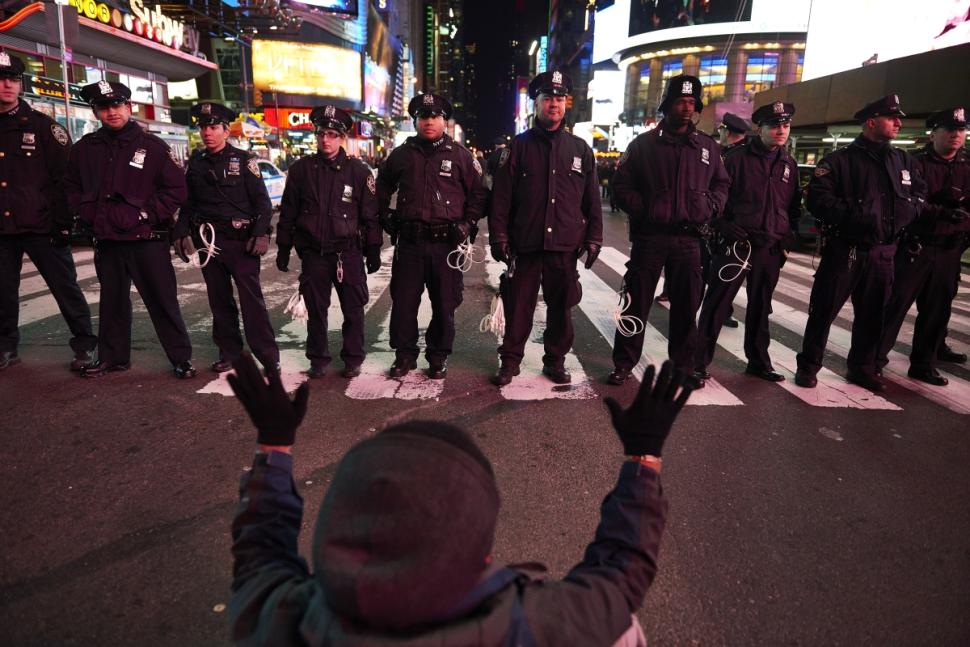SCOTUS Set to Deliver Another Deadly Blow to First Amendment
SCOTUS Set to Deliver Another Deadly Blow to First Amendment
Danny Panzella
Peaceful Streets Project NYC
2/6/2018
On December 4th 2014 Photojournalists Xavier Roper and William Lockett attended a Black Lives Matter protest in Times Square. The protest was focused on the NYPD in the wake of a Grand Juries failure to Indict NYPD Officer Daniel Panteleano for the murder of Eric Garner on Staten Island the previous summer.

Roper was standing in the street which was closed to traffic when Inspector Timothy Beaudette ordered the protestors to move to the sidewalk. An order that could physically not be followed due to the police barricades and a “wall of NYPD officers.”
Roper says he then heard an NYPD “white shirt” supervisor say, “just take somebody and put them in handcuffs.”
An officer then grabbed Roper and zip tied his hands behind his back, arresting him for “standing in the street.”
In a separate incident Lockett crossed another closed street to find a bathroom, he did not use a crosswalk due to the large volume of NYPD blocking the way and was arrested for disorderly conduct by an Officer Lombardo.
Roper and Lockett sued the NYPD for arresting them in retaliation for exercising their First Amendment rights. The basis for the suit was the NYPD supervisor’s explicit order to make an arbitrary arrest and that police barricades were positioned to block people from dispersing, making compliance with the dispersal order physically impossible.
With retaliatory arrest claims plaintiffs must not only demonstrate that the officers had no probable cause for the arrests that were made, but that the officers had no probable cause to arrest for any crime. This is known as the “no probable cause rule.” NYPD argued that if they didn’t have probable cause for disorderly conduct, they did have cause for traffic violations. Any evidence of retaliation was therefore irrelevant. The lawsuit was dismissed.
In November 2006 Fane Lozman was arrested for disorderly conduct at a Riviera Beach Florida, city council meeting.
Lozman says his arrest was retaliation for his opposition to the city’s plan to redevelop the waterfront by using eminent domain to steal private property, as well as his accusations of corruption on the council.
In fact video of the meeting shows Council member Elizabeth Wade specifically order police to remove Lozman following her condemnation of his accusations of corruption.
The court ruled that Mr. Lozman could not sue. The apparent retaliatory motive for the arrest was irrelevant; but the probable cause that justified the arrest was NOT the crime of disorderly conduct for which he was arrested, but for the crime he was about to commit, “disturbing a lawful assemble.”
The Supreme Court is soon going to hear Lozmans case and decide whether the “probable cause rule” will applicable nation-wide.
The First Amendment Foundation filed a supporting brief which said, “Given the wide ranges of offenses that can lead to arrest in todays world, the decision below effectively immunizes municipalities and officials against First Amendment retaliatory arrest claims.”
This type of rule allows police to arrest now and justify later. Months even years after police can conjure up other offenses which COULD have been used to arrest the defendants.
As a result police will be able to legally chill free speech by retaliating against protesters with whom they disagree with unfair or frivolous “jay walking” charges. New Yorkers saw similar retaliations when Occupy Wall Street protesters were arrested for “vandalism” for writing in chalk on sidewalks.
“What makes America beautiful is our personal freedoms, Constitutionally protected free speech cannot be suppressed at the whim of elected officials and public servants.” Said Lozman.